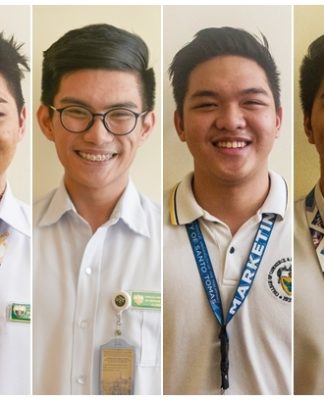ERLINDA Uy-Koe is wearing a pair of jeans and a blue shirt that says “an angel for Autism.” She doesn’t sport a pair of wings or wear a halo to echo her cause, but part of Koe’s mission—helping autistic kids—is nothing short of angelic.
Koe is the president of the Autism Society Philippines (ASP), a non-government organization dedicated to persons with autism. The mental disorder is characterized by poor social interaction and communication skills with restrictive and repetitive behavior. One out of 150 children has autism, and 67 children are diagnosed every day.
“When your child has autism, the whole family is affected, add to that the social stigma that they feel,” she said. “When someone sees a blind man, he’ll sympathize. But when he sees a child with autism, he’ll probably say the kid is spoiled, or the parents don’t know how to raise him. So just imagine what the family goes through.”
Koe, a communication arts graduate of UST, was a human resource department head when she married Jose, a Chinese businessman, in 1993. When she got pregnant, she resigned from her job to focus on her family. After a year, she gave birth to son Gio.
It was when Gio turned two years-old when she began to notice that her son was different from other kids. Gio would rarely socialize and would rather be alone. He also rarely talked.
“My mother told me not to worry because it also happens to other kids whose speech development is delayed,” Koe said.
On New Year’s Eve 1996, Koe’s family had a small party and a pediatrician friend attended. Gio’s odd behavior was evident that night.
“He just circled around the table [but] won’t interact with anyone. My friend advised me to see a doctor and have Gio’s case checked,” Koe said.
“When I told the doctor about Gio’s behavior and mannerisms, he told me: ‘if you’re thinking about autism, it’s too early to tell.’ That was a shocker for me because autism never crossed my mind.”
She then read a book about autism a friend had lent her. Her heart fell after the symptoms she had read in the book coincided with Gio’s case.
In 1997, Gio was diagnosed with autism, a fast-growing developmental disability among children.
‘Why me?’
“If I still denied it, I would just fool myself because I could already see the signs,” Koe said. “But it’s more like a question of ‘why me?’”
From then on, she and her husband focused on Gio’s needs and medication for anxiety and depression, behavior problems, inattention, and hyperactivity. But just as when the couple was still coping with their son’s autism, Koe gave birth to Johann. She was worried that the brothers might share the same fate.
“That’s why we decided we won’t have kids anymore. But my third son, Zhino, was [accidentally conceived],” she said.
Johann, 14, and Zhino, 13, have grown up normally like other kids.
No blaming
“My husband and I didn’t go through the process of blaming one another—it wasn’t an issue for us unlike in other marital relationships,” she said. “We’re also lucky that our families on both sides are very understanding. They accepted Gio completely.”
In 1998, Koe joined the ASP. Later on, she was asked to join the ASP board.
“They invited me to fill in a vacant position and I said yes,” she said. “But my husband told me I can’t fully commit to the organization because our children were still young at that time, so I left the board after two years.”
But there was more in store for Koe. Owing to her communication arts background, she was put in charge of ASP’s conferences and other events.
Finally, in 2004, Koe became the president of ASP. Progress was slow since there were only three women on her team. But more members eventually accepted to become trustees, and Koe would refer to them as “a team of hardworking angels.”
“I feel so blessed with them because they’re not only my team mates, they also became my friends,” she said.
‘Golden opportunity’
Gio, now 16, takes home school education with a special instructor who visits the house for quarterly assessments. Through the years, he has learned to develop his receptive communication and rarely throws tantrums.
According to Koe, handling children with autism is anchored on behavior modification and adaptation. She says she uses “picture exchange” to communicate with Gio.
“For example, if he wants French fries, then he would get a picture and show it to us. Then we would prompt him to say ‘I want French fries’ until he says it himself,” she said.
She hopes that Johann and Zhino would eventually take care of their kuya.
“I don’t want to require them to do that. But I want it to come [naturally] from them, that they would take care of their brother in the future,” she said.
With autism, things just don’t end in acceptance. Looking after loved ones with mental disability could be very challenging, but for Koe, it is a “golden opportunity to learn so many lessons in life,” she said.
After six years as ASP president, she will soon step down and become its first chairperson emeritus. But Koe’s mission has just begun. She says she still would work to raise awareness and understanding of autism. Good for them: heaven for these kids might just be within reach.














